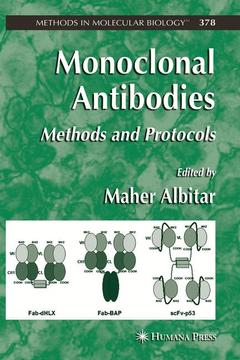Description
Monoclonal Antibodies, 2007
Methods and Protocols
Methods in Molecular Biology Series, Vol. 378
Coordinator: Albitar Maher
Language:
Subjects for Monoclonal Antibodies:
Keywords
Antigen; antibody; cell; chromosome; classification; development; diseases; immune system; leukemia; lymphoma; membrane; protein; proteins; targeted therapy; tumor
Publication date: 11-2010
228 p. · 15.2x22.9 cm · Paperback
Publication date: 06-2007
228 p. · 15.2x22.9 cm · Hardback
Description
/li>Contents
/li>Comment
/li>
Monoclonal Antibodies: Methods and Protocols examines a collection of state-of-the-art methods that employ monoclonal antibodies in a clinical setting with opening chapters focusing on the gold standard method for generating mouse monoclonal antibodies through hybridoma technology, future methods for engineering recombinant and humanized antibodies, methods for engineering soluble Fc fusion protein, and the use of antibodies and flow cytometry in the quantification of cell signaling proteins.
Specific chapters describe how antibodies are used for the diagnosis and classification of hematologic diseases. Subsequent chapters examine the advantages and most recent advances of using bead-based immunoassays, including the ability of bead-based technology to multiplex and analyze several analytes simultaneously, and the use of beads in detecting fusion proteins resulting from chromosomal translocations. Concluding chapters provide additional examples of methodologies that employ monoclonal antibodies.
Monoclonal Antibodies: Methods and Protocols provides descriptions of methods that cover a wide spectrum of applications in the field of monoclonal antibodies. This field will continue to expand and provide new and innovative techniques, not only in the laboratory, but also as a basis that complements targeted therapy.




